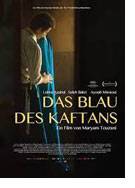

Opening 16 Mar 2023
Directed by:
Maryam Touzani
Writing credits:
Maryam Touzani, Nabil Ayouch
Principal actors:
Lubna Azabal, Saleh Bakri, Ayoub Missioui, Mounia Lamkimel, Abdelhamid Zoughi
Set in Morocco and applying the same careful attention that a talented tailor does to stitches, writer-director Maryam Touzani’s pattern, with screenplay collaboration by Nabil Ayouch, is divinely tailored; its narrative flows with poetic dialogue, imagery and detailing for audiences’ pleasure. Revel in the mannequin sheathed in blue silk, a spool of burnished gold cord, strong hands caressing oranges, and effleurage in the steam-filled Turkish bath. Miniscule movements and detailing enrich the sensuous experience of this film.
Set in an old, narrow but busy medina, Halim (Saleh Bakri) carries on a tradition with the support of his quiet, gracious, and gutsy wife Mina (Lubna Azabal). He snips through fine materials, stitches-and-pulls patiently, and embellishes each garment with exquisitely crafted detailing. Mina assiduously chooses the fabrics and deals with their wealthy pernickety clientele. Their lifestyle is quiet, companiable with his masculinity complimenting her femininity. Halim’s caftans are in demand, while Mina, unwell, struggles; an apprentice is sought, found, and put to work. She observes Halim instructing Youssef (Ayoub Missioui). The young man is quick to learn, asks relevant questions and has fruitful suggestions. Youssef’s taking on errands piques Mina; feeling threatened her watchfulness intensifies. Then, just as her health suffers, a fracas and a change occur at the shop. At the point where Halim is most vulnerable, Mina is her strongest and takes over managing affairs. “We’ve done everything we can, now it’s in god’s hands.” As surprising as unforeseen, it is the generosity of spirit that most confounds.
The small cast do a Trojan job; their steadiness, eye movements, body language, and positionings speak volumes of the swirling buried embedded emotions. Although Morocco is more liberal than most Muslim countries, nevertheless homosexuality is a crime with penalties attached. Touzani astutely works this, and other cultural features into her film, e.g., Halim and Mina’s encounter with a policeman, Halim’s routine visits to the hammam. With its slow pacing and steady rhythm, Virginie Surdej’s nuanced cinematography keenly picks out the golden threads that editor Nicolas Rumpl measuredly snips into proper proportions that Kristian Eidnes Andersen’s music enfolds and caresses. The Blue Caftan’s finishing stroke adds to its sensuality as it extolls human’s capacity for love. This is Morocco’s submission for the 95th Academy Awards’ Best International Feature Film. (Marinell Haegelin)